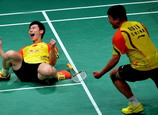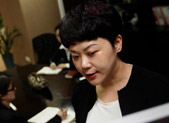
Zhang Jiandang, a 44-year-old Beijing strawberry farmer, was in no way prepared for the controversy that engulfed his son due to his ineligibility to register for the national entrance examination, or gaokao, in Beijing.
Zhang Tu, his 17-year-old son, is a second grader at the Experimental High School Attached to Beijing Normal University, whose grades show the potential for him to get in to top universities - if he could sit the gaokao in Beijing.
Unfortunately, his hukou, or household registration, is in Anhui Province, meaning he must take the test there instead.
In Anhui, different textbooks and exam papers are used and the competition is much fiercer. Hukou has been a major barrier for him since elementary school, but when it comes to gaokao, it becomes a life-altering hurdle that cannot be overcome by "sponsorship fees."
But according to education policies, if Zhang Tu was a foreigner, the situation would be markedly different.
Zhang Tu's mother, who divorced Zhang Jiandang years ago and is now a US citizen, earlier this year offered to help her son emigrate to the US. During the process, Zhang Jiandang discovered that foreign nationals are eligible to take the gaokao in Beijing - yet Chinese nationals who aren't from Beijing are not.
The father and son initially received a sympathetic response from the public when the China Weekly magazine reported the story Wednesday, but soon afterward they were questioned about eligibility to take the gaokao as a foreigner, prompting the authorities to issue a response giving reasons why Zhang Tu wouldn't be eligible to take the test.
"I guess people are venting their dissatisfaction over unfair education policies through our case, after all Zhang Tu has another choice but many children don't," Zhang Jiandang told the Global Times.
Clarification or PR?
"We don't really care about the exact conditions, but are angry that foreigners are eligible but our children, who are Chinese, aren't at all," an elevator operator surnamed Xu in Beijing, whose daughter has a hukou in Shandong Province, told the Global Times, in comments echoed by many netizens.
Facing wide public criticism over the seemingly preferential policy for foreigners, the Beijing Municipal Commission of Education (BMCE) said Friday that Zhang's interpretation was inaccurate, citing a Ministry of Education (MOE) policy in 2009 regarding eligibility for foreign nationals of Chinese descent to apply for colleges in China.
The policy stated that since 2010, overseas applicants had to have held a valid foreign passport for at least four years, and had to have a record proving they had actually lived overseas for more than half of the four years that preceded the year of admission.
The policy added that those who returned to China for high school education after emigration - without regaining Chinese citizenship - are eligible to take the gaokao as "aliens," as long as they have the permanent residence certificate required for foreigners living in China.
The BMCE further stated that Zhang Tu would have to fit these requirements to register to take the gaokao in Beijing "as an overseas student."
However, some experts have suggested that the BMCE response was more about public relations than genuine clarification.
An official with the Beijing Education Examinations Authority told the Global Times that the local policy also requires "aliens" to have a high school diploma or certificate of equivalent education level to register to take the gaokao, but did not mention the restrictions regarding time spent overseas.

















 Photo story: State-owned barbershop dying out
Photo story: State-owned barbershop dying out


![]()
